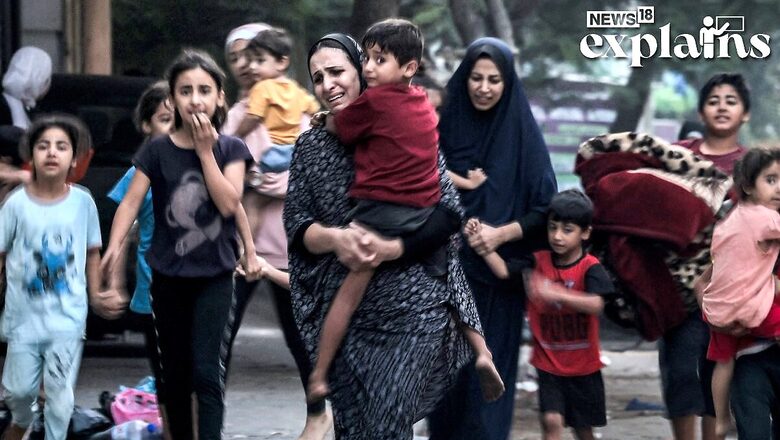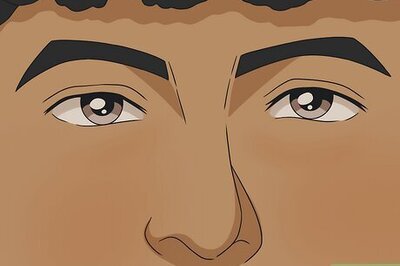
views
The fighting in Gaza, that has been raging for 20 days, following surprise attack by Hamas on Israel has shocked the world. Ever since the October 7 attack, Gaza’s Hamas-run health ministry says more than 7,000 Palestinians have been killed by Israel’s relentless retaliatory bombardments, mostly civilians and many of them children.
However, the capture of hostages by Hamas, Israel’s use of phosphorus bombs and the cutting of food, water and electricity in Gaza have pointed out to the war crimes that are being done on the pretext of the conflict.
While both Israel and Hamas have been accused of breaking international law during their latest conflict, the terms ‘crime against humanity’ and ‘war crimes’ can only be used under defined scenarios.
Here is all you need to know about what are ‘war crimes’ and ‘crime against humanity’ and have Israel and Gaza committed war crimes in the Israel-Gaza conflict:
WHAT ARE THE RULES OF WAR?
The international humanitarian laws during wars and conflicts are defined by the Geneva Conventions, drawn up after World War II and agreed on by almost every nation.
The four conventions agreed upon in 1949 set out that civilians, the wounded and prisoners must be treated humanely in wartime. They ban murder, torture, hostage-taking and “humiliating and degrading treatment” and require fighters to treat the other side’s sick and wounded.
Another set of rules in the law of war is the founding Rome Statute of the International Criminal Court (ICC). Set up in 2002, the ICC is the only global independent tribunal to probe the world’s worst crimes including genocide, war crimes and crimes against humanity.
The ICC defines war crimes as acts including intentional attacks on civilians, civilian settlements or humanitarian workers, destroying property where not militarily necessary, sexual violence and unlawful deportation.
Other agreements ban certain types of weapons, such as chemical or biological munitions. But not all countries have signed up to these.
How are War crimes Defined?
“War crimes” and “crimes against humanity” were both defined in the 1998 Rome Statute that established the International Criminal Court.
A war crime is a serious violation of international law against civilians and combatants during armed conflict, a “grave breach” of the 1949 Geneva Conventions that established a legal framework for war after the Nuremberg tribunals of top Nazis.
It covers more than 50 scenarios, including killing, torture, rape and hostage-taking. It also includes deliberate attacks on undefended population centres that are not “military objectives.”
A “crime against humanity” is defined as “a widespread or systematic attack directed against any civilian population” including “murder” and “extermination” as well as “enslavement” and “deportation or forcible transfer”.
HAS HAMAS COMMITTED WAR CRIMES?
Hamas, by firing thousands of rockets at Israeli towns and cities on October 7 and sending hundreds of gunmen across the border from Gaza has committed war crimes, experts have said.
Haim Abraham, a lecturer in law at University College London, said the evidence of crimes is clear.
“They massacred civilians at their homes. They kidnapped civilians, taking them hostage. All of these things are clearly war crimes,” Abraham said, according to AP.
It has also violated international law by taking hostages after a surprise attack. Israel has said Hamas has taken around 150 hostages, including Americans, Germans, Mexicans and Thais.
Jeanne Sulzer, a lawyer with the Commission for International Justice of Amnesty International France, said the Geneva Conventions state that “civilians should never be taken hostage. If they are, that may be characterized as a war crime.”
Palestine is a state party of the Rome Statute of the ICC, which means that Hamas leaders and personnel can be held accountable for committing genocide, crimes against humanity and war crimes if they are held guilty.
HAS ISRAEL’S RETALIATION BEEN LEGAL?
The Israeli military while attacking Gaza with airstrikes and missiles, also blocked deliveries of food, water, fuel, electricity and other essentials, collectively punishing 2 million Palestinians in Gaza.
United Nations human rights chief Volker Turk has already said that such a siege depriving civilians of goods required for survival is illegal under international humanitarian law.
The Geneva-based International Committee of the Red Cross has said the instruction for hundreds of thousands of people to leave their homes, “coupled with the complete siege explicitly denying them food, water, and electricity, are not compatible with international humanitarian law.”
Human Rights Watch has accused Israel of using munitions containing white phosphorus. The incendiary substance is not banned, but its use in densely populated areas has been widely condemned.
Both Hamas and Israel have been “indiscriminately bombing each other” which also constitutes a war crime, as it is not just targeting military personnel, according to Melanie O’Brien, visiting professor in international law at the University of Minnesota.
CAN LAWBREAKERS BE HELD TO ACCOUNT?
The International Criminal Court has the power to prosecute nations’ officials for violations and order compensation for victims. But some countries – including the United States, Russia and Israel — do not recognize the court’s jurisdiction, and the ICC does not have a police force to execute arrest warrants.
While the ICC is the only permanent international tribunal set up to prosecute war crimes, other international courts including the International Court of Justice and the European Court of Human Rights can hear cases related to alleged violations.
Amnesty International, which is also investigating Israeli attacks in Gaza, points to evidences of war crimes in Israeli attacks.
“Our research points to damning evidence of war crimes in Israel’s bombing campaign that must be urgently investigated. Decades of impunity and injustice and the unprecedented level of death and destruction of the current offensive will only result in further violence and instability in Israel and the Occupied Palestinian Territories,” Agnès Callamard, Amnesty International’s Secretary General said.
In 2021, prosecutors at the ICC opened a formal investigation into the Palestinian territories, including alleged crimes by Israeli forces and by Hamas and Palestinian armed groups. Israel, which is not a member of the ICC, has refused to recognise its jurisdiction or cooperate with the probe, which covers possible crimes going back to the 2014 war in Gaza.
The court has said only that its mandate to investigate crimes going back to 2014 is ongoing and would also apply to any alleged crimes committed during the current war.
(With inputs from agencies)
















Comments
0 comment